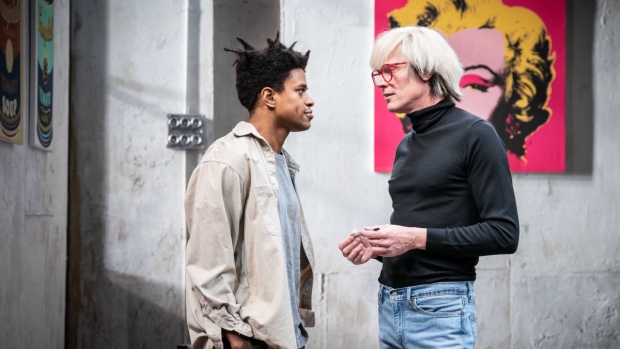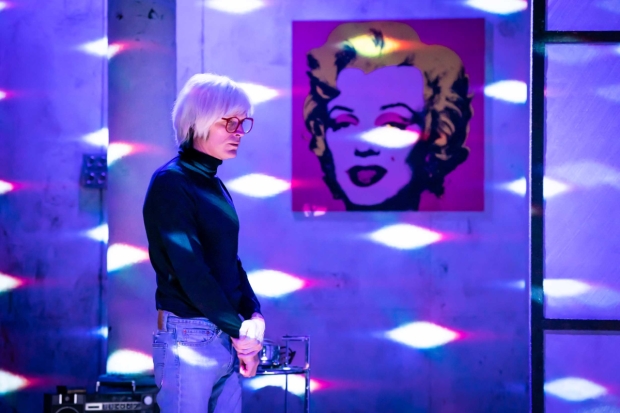The Collaboration with Paul Bettany and Jeremy Pope at the Young Vic – review
Anthony McCarten’s piece has its world premiere

© Marc Brenner
The Young Vic seems to be ticking off decades in American history. Hot on the heels of James Graham's sensational Best of Enemies (political debates in the 1960s) comes The Collaboration (artistic debates in the 1980s). Andy Warhol even makes an appearance in both shows.
Here, however, embodied by Paul Bettany, he takes centre stage as Anthony McCarten's new play, getting its world premiere, focuses on the relationship between the older artist and the young Jean-Michel Basquiat (Jeremy Pope), the former street artist whose star is very much on the rise as Warhol's is on the wane.
In the play, though not actually in life, they are brought together as a publicity stunt by their mutual dealer and art world wheeler dealer Bruno Bischofberger (a sharp Alec Newman); the works they reluctantly collaborate on, are eventually worth millions.
New Zealander McCarten is an expert at this kind of stimulating semi-biographical exploration, having written the biopics The Theory of Everything, Darkest Hour, Bohemian Rhapsody and The Two Popes''. In this, as in them, he cleverly weaves his arguments about the nature of art, the origin of inspiration and the corruption of the art world into a story that hangs roughly on the lineaments of the two men's lives.
In fact, the play takes quite a long time to get going. There's an awful lot of Warhol hanging around with his arms folded on Anna Fleischle's adaptably white-walled set which transforms itself into a downtown gallery and then into two different studios saying things like: "People say I've ruined painting; nobody loves me." Then Basquiat appears, full of energy and life, and opines: "I'm already better than Andy. I don't need this."
That verbal sparring goes on for quite a long time and is not reflective of the men's true relationship, which grew much more organically. There is also a lot of stuff about money and art, and the bankruptcy of inspiration. "Trash, trash," McCarten makes Warhol say, when Basquiat asks him what will be the source of art in the future. 'But we have to celebrate something."

© Marc Brenner
This kind of discussion is familiar from other plays about art, most notably John Logan's Red, which seeks to understand the root of creativity. The Collaboration in contrast is at its most interesting and effective when it probes the contrasting characters of the two artists, setting Basquiat's belief in art as a mystical activity against Warhol's pragmatic acceptance that "it's all about surfaces now."
The second act, set in Basquiat's chaotic studio which the germ-phobic Warhol feels the need to Hoover, takes flight. By this time, the men have grown close, and by this time too Basquiat has begun the heroin habit that will eventually kill him. The philosophising drops away and the vulnerability of the two men emerges – Warhol's obsession with his own ugliness, his self-loathing, Basquiat's with being ripped off and destroyed by a society he sees as essentially hostile. When a street artist friend is killed in an act of police brutality, his worst fears return to haunt him.
At this point, Kwame Kwei Armah's direction, which has tended to the stately, takes a steely grip and the performances, which have been compelling from the start, take over. Here in the darkness, we see the quality of the two men. Bettany is so good at impersonating the waspish brittleness of Warhol's exterior – all the clever remarks and name dropping – that it is devastating when he reveals the more gentle, damaged soul inside.
As Basquiat, Pope both captures the edgy, twitchy physicality of the man that has him bouncing on the soles of his feet to the songs of Miles Davis, but also the fraught interior and the intensity of concern that made his art so lastingly impressive. The irony is, as the play makes clear, that their deaths made both artists even more collectable. That The Collaboration brings them to such lively, argumentative life feels like a vindication.












